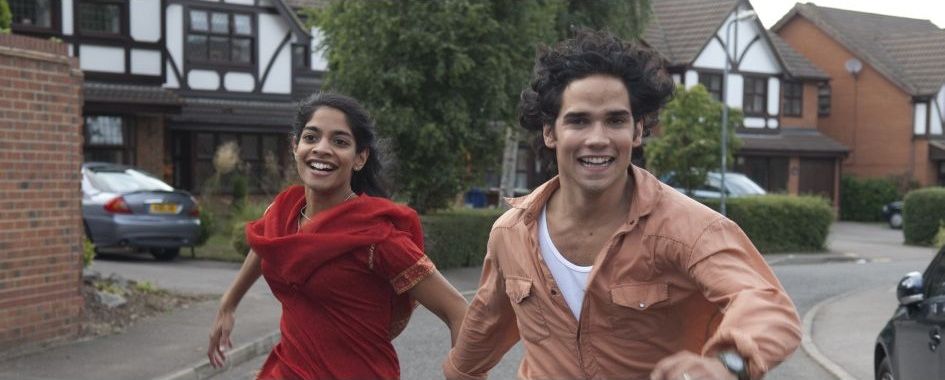| Worth seeing: | as a sweet, small and obvious social drama that lacks ambition |

| Director: | Nigel Cole |
| Featuring: | Amara Karan, Harish Patel, Meera Syal, Reece Ritchie, Arsher Ali, Christine Bottomley, Hassani Shapi, Neet Mohan, Ramrik Bhatt, Rani Moorthy, Shaheen Khan, Shelley King, Simon Nagra, Sudha Bhuchar, Tarlochan Singh Nandra |
| Length: | 94 minutes |
| Certificate: | 12A |
| Country: | UK |
| Released: | 11th May 2012 |
WHAT’S IT ABOUT?
Young British Asians, Atul (Reece Ritchie) and Vina (Amara Karan), have just tied the knot in a traditional Hindi ceremony in Bolton.
When their honeymoon plans fall through, the young couple have to begin their marriage in Atul’s childhood bedroom at his house.
His mother Lopa (Meera Syal) is supportive and helpful and grows increasingly frustrated that his father Eeshwar (Harish Patel) can’t come to terms with the fact that his little boy has grown up and persists in emasculating him.
Being able to hear his own parents on the other side of the bedroom wall, Atul can’t bring himself to consumate the marriage. But just as Atul’s father stops him feeling like a man, his own behaviour stops Vina feeling like a woman and soon, she can take it no more and goes to her mother for a heart-to-heart.
Once the secret gets out, the local gossips can’t get enough and the tension heaped on the young couple is almost too much to bear.
In working class Bolton, nothing is more important than family; can Lopa reign in the exhuberant Eeshwar, can Eeshwar patch up his damaged relationship with Atul and – most importantly – can Atul patch up his damaged relationship with Vina and kick-start a promising, fairytale marriage that’s on the verge of spluttering to a premature halt, before it’s even had a chance to begin?
WHAT’S IT LIKE?
The film is sweet enough, but it’s small, obvious and lacking in ambition.
A young couple, under pressure to consumate their marriage under the watchful eye of the groom’s busy-body parents is the stuff of 1970s sitcom, not a 21st century feature film.
The most revealing theme in this film seems to be that some young people don’t get on that well with their parents until a crisis in their live brings them together – hardly ground-breaking.
All the characters – from the central couple to their parents, friends and nosy neighbours – are stereotypes and their relationships arch.
Based on a play, as it is, one would think the source material should have merit; it must be that this worked better on stage than on film, because taken off the boards – where a sense of hyper-reality prevails – and put onto a screen – where we’re meant to be watching real lives unfold through the window of the camera-lens – the perils are either unengaging or simply don’t ring true.
In order for the plot to fit into place, the protagonists are necessarily rather unappealing; selfish, blinkered or weak – anyone with any get-up-and-go would not find themselves in these situations.
If Atul and Vina love each other as much as we’re told at the outset, it’s simply not believable that they’d suffer the difficulties that they do, despite the pressures they come under; despite their traditional backgrounds, these are present-day youngsters after all. And we just don’t care enough about them to support them through their troubles.
Damning the film with the faint praise Douglas Adams heaped on planet Earth in The Hitch-hikers’ Guide to the Galaxy, it’s “mostly harmless” – but simply doesn’t stand up to any scrutiny.
It’s not without a handful of charming moments – not least a thoroughly predictable meeting of minds between father and son – but a rather peculiar and thoroughly pointless coda seems to leave an astonishingly and unnecessarily bad taste in the mouth.
For the established cast, it’s embarrassing. It won’t help the newcomers launch their careers. And it’s a disappointing fall from grace for Nigel Cole after Made In Dagenham.
